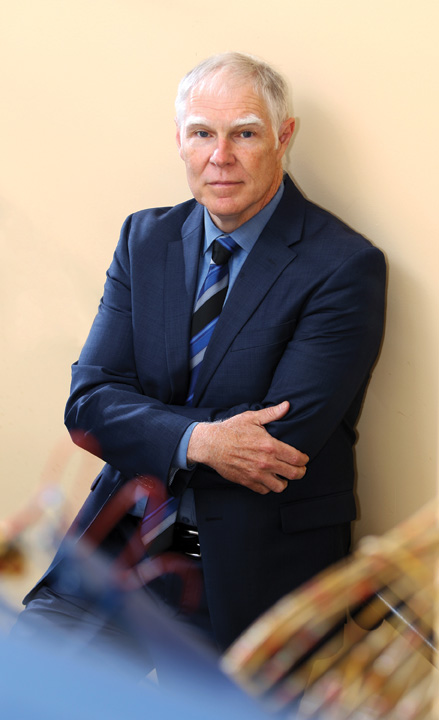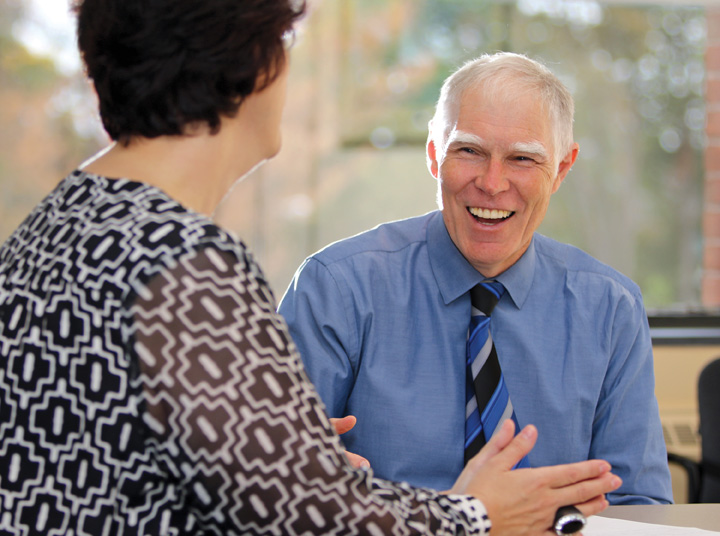New vice president for college advancement
Interview by Sonya Adams
Photos by Stan Godlewski
Michael T. Casey became Trinity’s vice president for college advancement in June 2017. He comes to Trinity from Skidmore College in Saratoga Springs, New York, where he served as the Collyer Vice President for Advancement. He has spent nearly 30 years in advancement, mostly at liberal arts institutions including Franklin & Marshall College, Wesleyan University, and Skidmore.
Casey is a 1981 graduate of Harvard University, where he earned a B.A. in Irish history and literature. At Skidmore, he was active in community and civic efforts, including serving as a member of the boards of the Waldorf School of Saratoga Springs, the Saratoga Regional YMCA, and the Saratoga Convention and Tourism Bureau.
The following excerpts are from an interview a few months after his arrival.
What drew you to Trinity College? The opportunity to make a difference. It seemed to me that this was—and is—a particularly important moment in Trinity’s history. I’ve long admired the college and its storied commitment to the liberal arts. It has a superb faculty, a deeply committed board and administration, and in [President] Joanne Berger-Sweeney, an energetic and visionary leader. This is a challenging time for higher education, but it is in just these moments that institutions with foresight, passion, and dedication can do something quite extraordinary. Who wouldn’t want to be part of that?
How do your experiences in a liberal arts setting—both in your own education and in your career—affect your work at Trinity? I firmly believe in the kind of education we offer and its ability to transform students and prepare them to make an impact as alumni. I’m a first-generation college graduate, and I was able to go to college because someone—someone I never knew!—thought it was important to provide scholarships to give students like me the opportunity to pursue their dreams. In a personal sense, then, the work I do and the reason I have stayed in it so long is to pay that debt forward. I want to honor the gift that I was given by helping to create opportunities for others. I also love coming into work not always knowing what I need to know to get the job done but having to learn it. One of the great strengths of a liberal arts education is that it develops your capacity to learn, and I get to test that every day.
What do you see as your priorities in this role? First, I need to get to know our alumni, parents, and friends, to understand what their hopes and dreams are for Trinity, and how we can help realize those dreams. To start, we are planning to survey folks this winter to get at those questions. What we learn will inform the programs we provide, how we communicate with our community, and how we can engage folks to further the priorities of the college. We’re also just finishing a strategic plan that will chart the college’s course for the next decade or more, and we will need partners to invest in that plan. Finally, I need to learn the campus—our faculty, our students, and our staff—and, in turn, how we can best organize our office to further the mission of the college.
What can alumni and parents do to help Trinity and its students succeed? Many are doing that already. Every gift they make, every hour of time they volunteer, every time they cheer for our teams or promote the college to their friends and neighbors, they are making Trinity better and stronger. So a simple answer is we need those who are doing these things to continue, and we need others to join them. The more folks we have pulling together in the same direction, the further and faster we can move and improve. That can be contributing to our financial aid program, serving as a career mentor, or encouraging great high school students to apply. All of these investments contribute in material ways to the experiences of our students.
How do you plan to increase alumni and parent engagement with the college? First and foremost, we want to help people understand the impact of their gifts. When you’re making a gift to Trinity, you’re not making it to some nameless, faceless organization. At the end of the day, you’re making gifts to help real students make real progress in realizing their full potential.
 What do you feel are the college’s greatest strengths? There is a deep, abiding passion for Trinity among our alumni, parents, and friends. We hear when they are happy with what is happening here and, occasionally, when they’re unhappy, but it always comes from a place of deep affection and wanting what’s best for the college. Our history also is a strength, knowing that we have been here for 200 years, enduring, surviving, and flourishing in spite of wars, recessions, depressions, and all kinds of natural disasters and calamities, yet still producing graduates with the ability and the drive to make positive change in the world. Trinity College is a public good. The good that we do ultimately plays out in the impact that our students have in the world beyond, and to my mind, that’s the best measure of a college’s worth. It is particularly important for us to keep our doors as wide open as possible so that every student who has the ability, desire, and capacity to succeed at Trinity can come to Trinity. Put another way, great students are what make Trinity great.
What do you feel are the college’s greatest strengths? There is a deep, abiding passion for Trinity among our alumni, parents, and friends. We hear when they are happy with what is happening here and, occasionally, when they’re unhappy, but it always comes from a place of deep affection and wanting what’s best for the college. Our history also is a strength, knowing that we have been here for 200 years, enduring, surviving, and flourishing in spite of wars, recessions, depressions, and all kinds of natural disasters and calamities, yet still producing graduates with the ability and the drive to make positive change in the world. Trinity College is a public good. The good that we do ultimately plays out in the impact that our students have in the world beyond, and to my mind, that’s the best measure of a college’s worth. It is particularly important for us to keep our doors as wide open as possible so that every student who has the ability, desire, and capacity to succeed at Trinity can come to Trinity. Put another way, great students are what make Trinity great.
What do you see as Trinity’s biggest challenges? Many of the greatest challenges and issues of our time are being played out daily on college campuses, including Trinity. I think that’s how it should be. But how do we help our students and our larger community engage with those issues in ways that will help them—help all of us—grow? That’s the question. Growth only happens when you make students uncomfortable, when you make them stretch, make them find ways to develop in ways they didn’t believe they could before, all while in a context that is safe, physically, emotionally, and otherwise.
What do you see in Trinity’s future? Corny as it sounds, the best is yet to come. One of the things I am charged with is running a campaign. I think it’s important to understand that campaigns are only a means to an end. Certainly, they create an opportunity for people to invest in what is most important to them and to the institution at this particular moment in time. But it’s also a time when we can reaffirm to ourselves and others Trinity’s value in the world. The investments certainly have a material impact on the education we can offer our students. But they also signal to the world that we as a community continue to see the value of Trinity. I think our leaning into our location in a capital city is exactly right … there is real opportunity here. Many of the major issues that are facing us in the next 20 to 30 years are understanding how we make cities these engines of progress, development, and opportunity for all in our country, and giving our students the opportunity to engage with these issues facing cities on a regular basis is a really powerful one. In many ways, we can see where we need to go—what we need now are partners in helping us get there.
